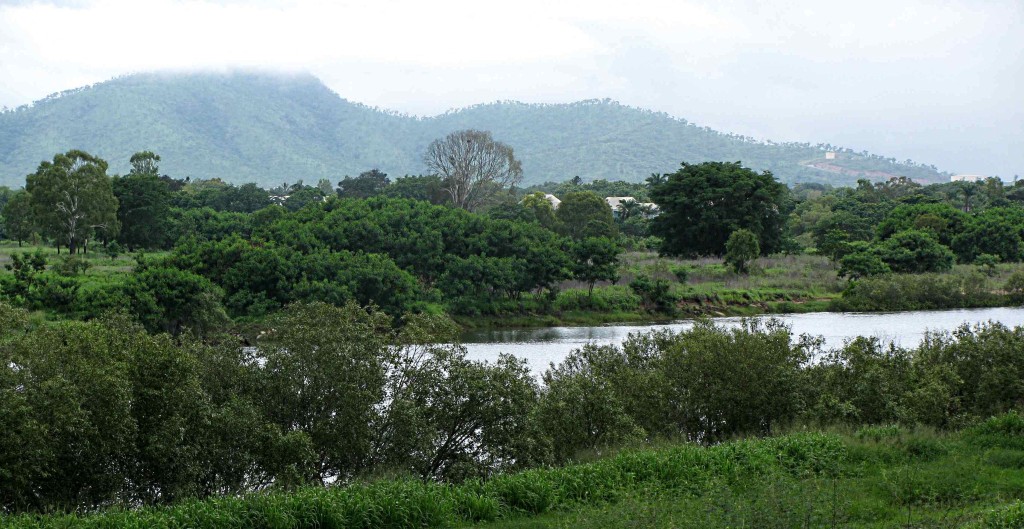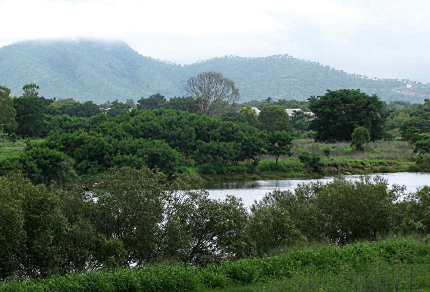
Ross River, Townsville (© Magi Nams)
The city of Townsville was quiet just before 6 a.m., the river beside me flowing serenely as I ran and walked the parkway from Railway Estates to the Townsville Golf Club. A kookaburra’s crazy laugh ripped into the dawn like a madman’s voice among the sane calls of tree martins, peaceful doves, and mynas. To the south, ranges of hills were faint images behind a screen of haze. The air was still and clinging, refusing to wick away sweat. A man on the golf course shielded his eyes from the sun while he searched for his ball. The humidity and brazen sunlight that jointly characterize Townsville’s summer were out in full force.
On one of our first grocery-shopping excursions in Coles, the cashier, upon recognizing our accents as foreign, asked where we were from. “Canada,” Vilis supplied.
“Ah,” she replied. “Climate’s a lot different there.” Vilis responded, “Yeah, we’re trying to get used to the heat and humidity here.”
She laughed. “I’ve lived here all my life, and I’m still trying to get used to the heat and humidity.”
Late this morning, when we attended a church service, the speaker, who lives in Cairns but has been vacationing in Brisbane as well as making a stop in Townsville, told us how much he’d missed having heat and humidity during the past few weeks. Vilis and I smiled. I suppose it’s all relative.
While we lazed away a peaceful Sunday afternoon in the air-conditioned comfort of Richard’s living room, we heard three intriguing bits of information on national radio. The first was that a billabong is an oxbow lake. I learned of the existence of billabongs when I was taught to sing “Waltzing Matilda” as a schoolgirl. Billabong. The word sounded funny, utterly foreign, and quite enchanting. I was told it was a pond. I learned of the existence of oxbow lakes when I took a geography class at university. The professor showed the class photographs of oxbow lakes, which were typically curving remnants of rivers that had carved out new channels and left the old stranded. The oxbow lakes, separated from the rivers, became still water, which is, I suppose, why my elementary school teacher described a billabong as a pond. But with this new information, I was able to envision that jolly swagman from the song sitting beside an oxbow lake, under the shade of a coolibah tree. Trouble is, I don’t have a clue what a coolibah tree is. (I later learned that a coolibah is a species of gum tree.)
The second information tidbit was that the Australian government is considering putting new regulations in place to control the excessive use of solariums, which, as far as Vilis and I could surmise, were tanning beds. Now, why anyone living in this country ruled by the sun would choose to use a tanning bed was simply beyond us.
The third bit of information had us listening closely with a vague sense of alarm. A tropical low is building in the Coral Sea, a meteorological situation that typically precedes a cyclone. The ‘Are YOU cyclone ready?’ sign we saw while driving to Paluma and the list of cyclone preparations on Richard’s fridge suddenly took on heightened relevance. Stock up on food. Bring in lawn furniture and plant pots. Close all windows and doors and draw drapes or blinds. Stay indoors. Ensure vehicle is filled with gas. In other words, batten down the hatches and prepare for evacuation. Today, the low presented no problem, but it might a few days down the line.
At dusk, Vilis and I strode down Richard’s street toward the parkway for what was becoming our evening constitutional. In the roundabout at the end of the street, a circle of seven tall, narrow trees draped with layers of drooping leaves resembled a clan of druids in tattered robes conferring against a backdrop of dying sun and building cloud. In the parkway’s early darkness, bats streamed across the sky as far away as our eyes could detect them, their bodies stark black shapes against fluffy, pink clouds. “It’s like they have one collective consciousness,” Vilis murmured, and then added, “They look like something out of a horror movie. You know, night falls, and the bats descend into the city in search of people to eat.” He laughed at my suggestion that he write a horror novel incorporating flying foxes as the menacing villains.
Around us, the oncoming night looked unsettled, with sky-copses of cumulus clouds rising high into offshore air. The hills to the south of the city were almost obliterated by dense sheets of royal blue cloud. “There aren’t many people out walking this evening,” I commented. Vilis nodded sagaciously. “That’s because they know.” About the bats.


